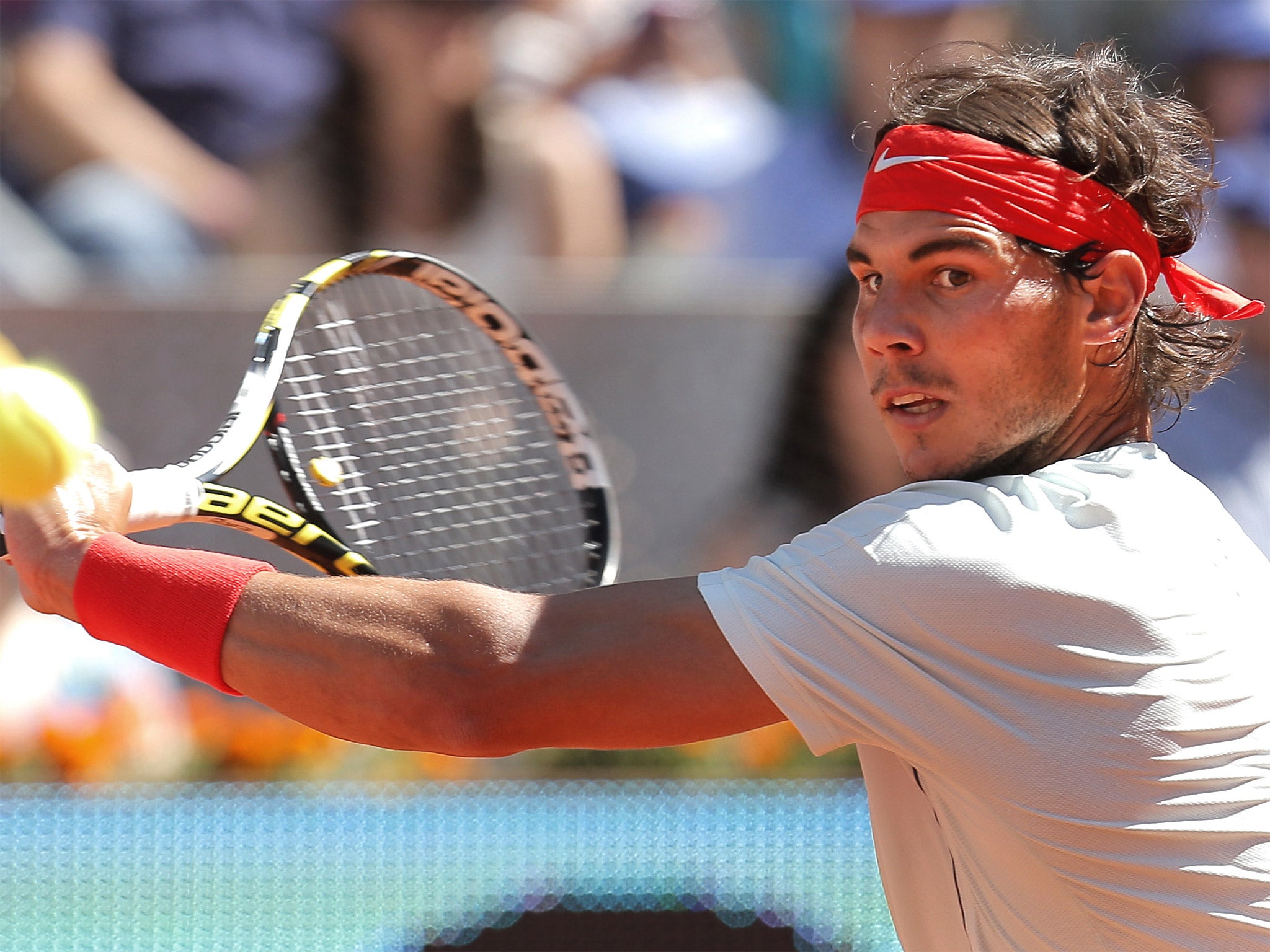Rafael Nadal treads lightly on delicate knees as French Open looms
Spaniard reveals big cut in practice routine as he targets an eighth Roland Garros title

Your support helps us to tell the story
From reproductive rights to climate change to Big Tech, The Independent is on the ground when the story is developing. Whether it's investigating the financials of Elon Musk's pro-Trump PAC or producing our latest documentary, 'The A Word', which shines a light on the American women fighting for reproductive rights, we know how important it is to parse out the facts from the messaging.
At such a critical moment in US history, we need reporters on the ground. Your donation allows us to keep sending journalists to speak to both sides of the story.
The Independent is trusted by Americans across the entire political spectrum. And unlike many other quality news outlets, we choose not to lock Americans out of our reporting and analysis with paywalls. We believe quality journalism should be available to everyone, paid for by those who can afford it.
Your support makes all the difference.Practice makes perfect, which is one of the reasons why Rafael Nadal continues to play down his chances of adding an eighth French Open to his ever-growing tally of titles next month. The 26-year-old Spaniard, who is the odds-on favourite with most bookmakers to win at Roland Garros, revealed here that he has had to cut down on his practice schedule in order to nurse his troublesome knees through his latest comeback.
Nadal, who begins his quest for a seventh Rome Masters title against Fabio Fognini today, has reached the finals of all seven tournaments he has played, winning five of them, since returning after a seven-month lay-off in February. His only defeats in 34 matches this year were against Horacio Zeballos, in the final of his first tournament in Chile, and against Novak Djokovic in last month's Monte Carlo Masters final.
Although he described his comeback so far as "a dream", Nadal admitted: "I am not practising a lot. I just practised for 50 minutes today. A year ago on a day like today I would practise for nearly two hours. But it seems like that's not decisive because I am able to compete well and keep having chances against the best players and keep having chances to win. The important thing is to adapt yourself to the conditions and accept your situations."
Nadal stressed that he had not returned with his previous levels of form or fitness. "I am still not like I was last year, when I started from the beginning in January and I was able to play for six hours in Australia against the best," he said. "I played at full intensity for six hours [against Djokovic in the Australian Open final]. I was not ready to do that when I came back and I don't know if I am ready to do it today."
The Spaniard, who has played only three-set competitions this year and will need to win seven five-set matches to keep his French Open title, said his level had not been very high in most tournaments since starting his comeback. As for the clay-court season in Europe, Nadal said he had been well below his best in Monte Carlo and Barcelona, though he felt there were times when he had played "at a very high level" en route to the title in Madrid last week.
Nadal's verdict would appear to back up Andy Murray's theory. The Scot, who hopes to celebrate his 26th birthday today with victory over Spain's Marcel Granollers in his opening match, believes that Nadal was so far ahead of everyone else on clay before his lay-off that he has been able to win on his return despite not being at his best.
"Maybe he's not playing as well on clay as he did, say, two years ago, but once he starts to play more and more matches he's going to get up to that level," Murray said. "On this surface he's still a long way ahead of the rest of the pack. His consistency has been very impressive since he came back."
Nadal, however, insisted he had "never had that feeling", which he felt was one of the reasons for his success. "I respect every player," he said. "I don't feel better than the rest. I feel that when I go on the court I can lose or I can win. I take care in every moment in every match. I know when I go on court that anything can happen. For that reason I try to fight for every ball, even if it's in the first round against X player or a final against a very top player."
Djokovic began his Rome campaign with an emphatic victory over Spain's Albert Montañes. The world No 1 went a break down early in the first set but quickly restored order to win 6-2, 6-3. He next faces the winner of today's second-round meeting between Stanislas Wawrinka and Alexandr Dolgopolov. Roger Federer was similarly quick about his work, beating Potito Starace 6-1, 6-2.
Join our commenting forum
Join thought-provoking conversations, follow other Independent readers and see their replies
Comments